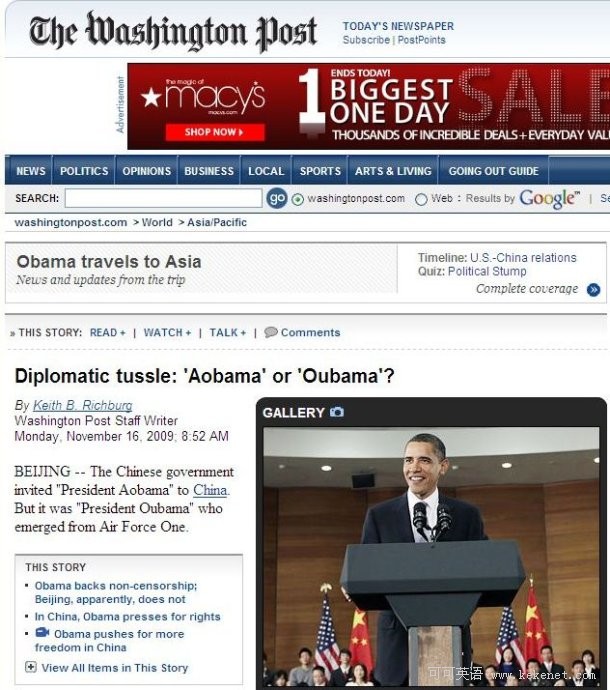(单词翻译:单击)
背景
【背景】
到底美国总统Obama的中文名字是“奥巴马”(大陆译法)还是“欧巴马”(台湾、美国使馆的译法),本想就这个题目写篇博客,不过《华盛顿邮报》11月16日就这个题目发表该报记者发自北京的报道,题为Diplomatic tussle: 'Aobama' or 'Oubama'?(外交角力:“奥巴马”还是“欧巴马”?),今天就转载一下(英语原文附后):
英文原文
【英文原文】
Diplomatic tussle: 'Aobama' or 'Oubama'?
By Keith B. Richburg
Washington Post Staff Writer
Monday, November 16, 2009; 8:52 AM
BEIJING -- The Chinese government invited "President Aobama" to China. But it was "President Oubama" who emerged from Air Force One.
In a visit expected to be marked by trade tensions, disagreements over Tibet and disputes over the value of the Chinese currency, one of the earliest diplomatic tussles involved how to spell -- and therefore pronounce -- the name of the 44th American president in Mandarin Chinese.
And the wrangling went all the way to the White House, or, as the Chinese have always called it, the "Bai Gong," meaning "White Palace." But the Obama administration was having none of that, reminding their Chinese hosts that the United States has no palaces, and insisting on using in official statements the term "Bai Wu," literally "White House."
"The Embassy is working to standardize the translation of common vocabulary in Chinese," said U.S. embassy spokeswoman Susan Stevenson in an e-mail, when asked whether President Aobama or President Oubama was coming to China.
"Ou-bama," she said, "conforms to the actual pronunciation of the name and is our preferred Chinese appellation." And she added, "By the same token, "Bai Wu" (which means "White House") is more accurate than "Bai Gong" (White Palace)."
But President Oubama living in the Bai Wu also more closely conforms to how the names are commonly rendered in Hong Kong and Taiwan, which may explain why, so far at least, official Chinese media, and the Chinese foreign ministry, continue to use the old familiar forms.
The president has been referred to here as "Aobama" since he first appeared on the national scene. And change, as he himself often says, is hard.
One foreign ministry official Chinese translator even appeared to be mocking the American translation efforts. He said he preferred "Aobama," because the Chinese character for Ao is used also for Australia and as part of Macao, and means "profound and deep." By contrast, "Ou" is the Chinese character used for Europe.
The official agreed that the pronunciation of "Oubama" may indeed be closer to the American pronunciation of the 44th president's name. But he said it sounded strange to the ear, reminding him slightly of the Japanese term "Obaasan," which is a rather unkind way of referring to an old lady ("Obaasan," while Japanese, is widely understood by Chinese on Taiwan and in Hong Kong).
What the translator did not mention, however, is that the "Ao" character has a lot of other less complimentary meaning -- which may be why the Chinese government prefers to use it for Obama. "Ao" can also mean "difficult to understand," "abstruse" and "obscure."
The translator also recalled that the White House versus White Palace dispute was an old one between the embassy and the foreign ministry here. He said the ministry had no plans to change for the moment, and would probably take its cue from Xinhua, the official Chinese news agency.
So for the moment, Chinese journalists covering the visit are left with dueling Chinese and American translations of both the American president's name, and the name of the place where he lives and works.
"I think any change will take time to work its way through," Stevenson said in the e-mail, recalling how long it took for "Peking" to become "Beijing." She added: "The U.S. government, however, has adapted this new vocabulary."
中文译文
【中文译文】
中国政府邀请“奥巴马总统”访华,结果从“空军一号”下来的却是“欧巴马总统”。
此行免不了贸易争端、西藏问题分歧和中国货币币值争议等等。还有另一个外交交锋是如何拼写第44任美国总统的名字,接下来当然是如何用中国普通话把它读出来。
交锋可以一直追溯到“白宫”的译法。中国人向来称之为“白宫”,意思是“白色的宫殿”。但奥巴马政府对此持有异议。他们提醒中方说,美国没有宫殿,坚持在官方声明中使用“白屋”,意指“白色的房屋”。
当被间及即将访华的是“奥巴马总统”还是”欧巴马总统”时,美国驻华使馆女发言人苏珊•史蒂文森在一封电子邮件中回答说:“使馆正致力于常用词汇的中文翻译标准化。”
她说:“‘欧巴马’符合这个名字的正确发音,我们偏向于这个中文翻译。同理‘白屋’比‘白宫’更准确。”
但“欧巴马总统”生活在“白屋”更接近于香港和台湾的名称用法。可能正因如此,至少迄今为止,中国官方媒体以及中国外交部继续沿用原有译法。
自从这位总统首次出现在中国的电视屏幕上,其名的中文译法一直是“奥巴马”。按他本人的话说,改变很难。
中国一名官方译员承认,“欧巴马”的译法可能事实上更接近于美国的发音。但他说,这听起来很奇怪,因为让他想起日语词汇“欧巴桑”这个对老年妇女不友善的称谓。
他说,他更喜欢“奥巴马”,因为汉字“奥”的同音字还有“澳大利亚”和“澳门”的“澳”,“奥”还有“深邃”的意思。相比之下,“欧”是“欧洲”的“欧”。
因此眼下,中国记者在报道这次访间时,这位美国总统的名字和他工作生活的地方就各自有了不同的译法。
“我认为,任何变革都要花费时日,”史蒂文森在邮件中说。她回忆起中国首都的英文名从“Peking”到“Beijing”花了多长时间。她说:“不过,美国政府已经适应了这个新词汇。



